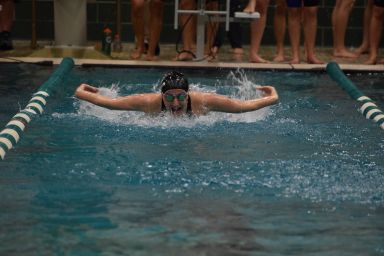It’s 5:30 a.m. and most people are snug in their bed. They’re unaware that student-athletes everywhere are getting ready for their first practice of the day. Many athletes are already sore from previous practice. Add being tired on top of that and practice can become a daunting task.
Non-athletes are always baffled by the fact athletes get up and practice their respective sport at such an early hour. What they fail to recognize is the toll that morning practices really take on student-athlete.
According to a study of 1,845 students conducted by the department of psychology at University of North Carolina at Charlotte, 27 percent of students were at risk for at least one sleep disorder. These at risk students are also at risk of academic failure.
Cheri D. Mah, graduate researcher at Stanford University, ran another study that followed 11 basketball student-athletes and their sleeping pattern and concluded that when they got more rest their athletic performance increases.
While these statistics are not surprising, what is surprising is the lack of sleep many students tend to get. Most adults need 6-10 hours of sleep. On average, most college student get 6-6.9 hours of sleep per night according to the University Health Center of the University of Georgia.
Many athletes on campus have at least one morning practice. It’s easy to see the difference between a team with just a few morning practices a season and one with them every week.
“Thankfully the soccer team only had morning practices during preseason,” Alex Garces, junior soccer player, said. “If we had morning practices during the year I think it would negatively affect both my academics and sleep schedule. I would definitely not get enough sleep to be able to function during class.”
While the soccer team may only have a few morning practices during the preseason, the swim team has up to three a week.
“While I hate waking up early as much as the next person, I understand why we have morning practices. It sucks to walk across campus in the cold and dive into an even colder pool hours before most people would even think about waking up. However, I can’t deny the feeling of accomplishment of being done with a 4,000 yard workout before half of the campus is even awake,” Marisa Linsky, freshman swimmer, said. “One of the things I liked most this year was being able to bond with the team over meals in the cafeteria, especially having breakfast after morning practice. At 8:30 a.m. we are almost always the only people there and we get to sit, talk, eat and try to erase the memory of morning practice from our minds.”

Morning practices can be hard on students especially when trying to balance out school work. Katherine Buckman, junior swimmer, states she naps after morning practice instead of working on her homework. Buckman also states that since she naps after practice it is harder for her to fall asleep at night making it an endless circle of a lack of sleep.
It’s not just students that have opinions on morning practices but also coaches. Since they are the ones who decide whether or not a team would have morning practice, their opinions are always considered in the decision.
“I feel the morning practices are positive. I do not do a ton of them but the ones that I do are great!” Jackie Neary, field hockey and lacrosse coach, said. “A few reasons [we have them are] the weather [for] one. In the fall it’s nice to do an a.m. to escape the heat and in the winter to escape the cold. And the good thing about a.m. is everyone makes them!”
While Neary states that the benefit of having morning practice is having the rest of the day to do what you need to do, she also sees the downfall of oversleeping which worries not only her athletes but also her as a coach.
Having morning practice is sometimes not just about the coaches opinion. It can also be because of their schedule. Both the women’s soccer and tennis teams are unable to have morning practice due to both coaches being part-time teachers.
“Due to the fact that I am an English teacher by day I am unable to run morning practices,” Terra McHenry, women’s tennis coach, said. “One benefit I see to practicing in the afternoon is that for the most part, our 3:30- 5:30 time slot seems to fit the best with the majority of our team members class schedules.”
It is clear that morning practices are what the student athlete makes of them. These practices are not used as a torture method by coaches but as a way to work around all their athletes’ schedules. Any practice can affect a student-athlete athletes’ sleep and academics not just morning practice. While sleep is definitely something that factors into how effective a morning practice is, how the student-athlete prepares for the practice can make all the difference in the world. Good time management skills are definitely something that all student-athletes need to have to be able to succeed not only in their sport but also academically.


